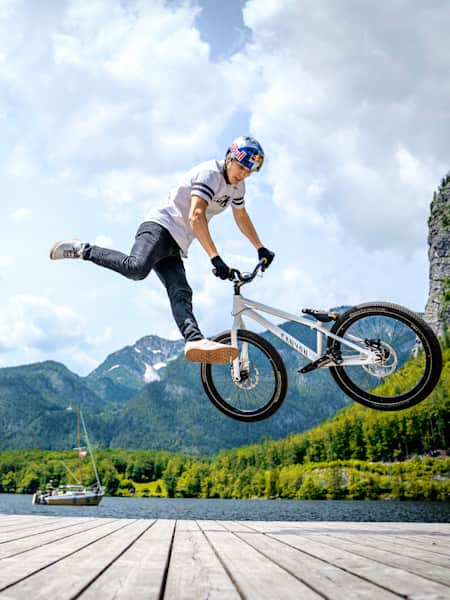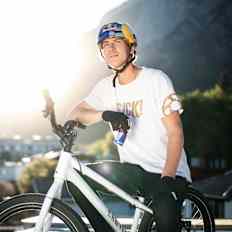Overlooked by Patscherkofel mountain on a bright day in rural Tyrol, just a few kilometres from his Innsbruck home, Fabio Wibmer is about to start riding. And when the Austrian pro gets on his bike, the world watches.
Most recently, the downhill and trials bike rider wowed millions online with his video Home Office, made in response to lockdown. In the film, he transforms his house in ways that few would imagine possible – jumping off his roof on his bike onto a mattress perched in a tree, netting a basketball with his back wheel and binning a bag of rubbish using a homemade catapult. Wibmer's tricks have a sense of humour. They're also insanely difficult to pull off.
These sorts of unique moves are exactly what the 25-year-old has been training for almost all of his life. Wibmer, it would seem, has a more vivid imagination than most of us and it makes the world his playground.

You don't need a budget or a chic location to make the most of your creativity
"I look at the absolutely normal things around me from a different perspective," the Austrian says. "I think of using them in ways that could be a good idea. And then I put those ideas into practice." Wibmer makes it sound so simple and for him, in some ways, it is.
"You don’t need a budget or a chic location to make the most of your creativity," he says. "Sometimes you even have better ideas when your opportunities are limited." Simple, maybe. But not easy.
The rider grew up in a mountain village in East Tyrol. Not the greatest springboard to becoming famous.
"I love Oberpeischlach," he says. "But there was absolutely nothing to do there. We didn't have as much as a piece of even ground. You could play football for five minutes and then the ball would roll off downhill."
Wibmer was six when he realised something important: a meadow and a fallen tree can actually offer hours of fun if you think creatively – and get yourself the right tools. A meadow can become a motocross track and a fallen tree can be part of a trials course.
After a family day out at the Motocross World Championship in southern Austria, Wibmer and his cousin Gabriel begged their parents to buy them mini motocross bikes. From that moment, his uncle's field went from being a bad football pitch to the perfect motocross course. And the forest at the back of the house became an adventure playground with endless inspiration for daring stunts and heroic feat.
Stay curious
Fast-forward to today and Wibmer is now his home country’s most successful YouTuber, with more than five million subscribers; total views of his videos number somewhere in the hundreds of millions.
His success is, of course, down to his ingenious skill on both trials and downhill bikes. But the extra element is creativity. Wibmer's videos tell a story. His tricks are surprising and funny. To devise them, he says he thinks like his six-year-old self. He examines everyday objects from his surroundings and uses them to create unexpected ideas.
The best example of this is Fabiolous Escape, the video that gave Wibmer his breakthrough five years ago. "Fabiolous Escape was originally my entry for a video competition, where the aim was to film a sleek line in a single take," he says. "I thought to myself, 'Why not tell a story, actually, and get the whole village involved'."
I take things that everyone knows and give them a new twist
Wibmer's escape from the somewhat blundering village policemen takes him over rooftops and dining tables, and is peppered with Front Flips, drops and a balancing act on his handlebars. The result: he won the competition and the video has now had more than 60 million views.
"I take things that everyone knows and give them a new twist," says the former sports marketing student on the success of his concept. "Like in [his 2017 video] Urban Freeride Lives, where I leap down stairs. Anyone can imagine that – unlike with a ramp that has dimensions the viewer can't gauge so easily."
Ideas constantly pop into Wibmer’s head when he's out and about: "I see a wall and think how I could ride on it, or jump over it." On one occasion, he was scouting for locations in the Malta Valley in Carinthia, a region in the eastern Alps, when a 200m-high dam wall with a security rail on top caught his eye.
"I saw the handrail and thought to myself that if that thing was only 10cm off the ground, I'd be able to ride along it, no problem. So, then I just had to blank out the knowledge that there was a 200m drop next to me."
A couple of days later, secured with a rope, Wibmer cycled along the rail – the width of one of his wheels – from one end of the dam wall to the other, with the yawning abyss just to his left. "It was an indescribable feeling," he says. "Especially afterwards." Mere mortals might want to have a can of deodorant close at hand after watching the YouTube video, titled Riding a bike on a 200m high rail.
Screw up
Even for a rider so experienced in creating something from nothing, success isn't guaranteed. Wibmer says many of his ideas end up going nowhere, "because in reality they didn't turn out like I saw them in my head. Or they end up being totally lame, even though I'd imagined they were ingenious."
If I can do a trick within 30 goes, I'm not interested
However, according to the Austrian, that doesn’t matter. Part of being truly creative is allowing for mistakes and potential humiliation, and being prepared to do stuff that might end up being useless. In fact, Wibmer says, it's often the very ideas that seem the most hopeless that are most worth pursuing.
"There are people who give up on a trick if they haven’t managed to pull it off after 30 goes," he says. "If I can do a trick within 30 goes, I'm not interested. It can't have been hard enough. I'm only excited by a trick if it takes me 200 or 300 goes to do, like in the Home Office video, where I flick a basketball into the basket with my rear wheel."
When tenacity alone isn't enough, Wibmer still won’t give up. On those occasions, he falls back on his creativity to find a workaround that will help bring a good idea to fruition. "Once, when I was in the garage, a bike that I'd turned upside down for repair caught my eye," he says. "I thought, 'what would it be like to jump onto a bike in that position and create a mirror image?'"
His first attempts left him battered and bruised. "Then I had the idea of fixing the lower bike to the spot and locking the brakes." The trick worked and you can see it now in the Home Office video, along with the basketball sequence.
Get inspired
"I've always been inspired by what other people do," says Wibmer. "Then, I've made it my own." This is what made a spring day in 2009 the most important of Wibmer's life. The Austrian, then aged 14, was searching the internet when he happened across Inspired Bicycles, a video by Scottish trials-bike titan Danny MacAskill. "I knew right away that I wanted to do something similar," he says.
Wibmer immediately switched his motocross bike for a trials bike and used MacAskill's videos to teach himself tricks. He began to post videos of his progress, too, and gradually built up a community of his own. He first met his idol in 2012 at a Red Bull Wings Academy workshop. "I was so nervous I couldn't speak," says Wibmer. "He's such a big inspiration."
They stayed in touch and MacAskill ended up making Wibmer an offer. MacAskill was looking for people to join him on a show tour, as part of his professional street trials team, Drop and Roll. Wibmer accepted. He's now the youngest member of the team of four, who perform live across Europe, turning fans' heads with flips of all kinds off ramps, down ladders and over bespoke obstacles. It's all a far cry from the meadow in Oberpeischlach.
Sometimes I watch skateboarders and try to repeat their moves
Find solutions
When it comes to seeking inspiration for his next challenge, Wibmer doesn't limit himself to the bike community. Over the years, he's learned the value of looking further afield. "I'm interested in how other communities and sports approach a problem," he says. "Sometimes I watch skateboarders and try to repeat their moves. In Home Office, I jump off the roof, onto a tree and then slide down it sideways. I got that idea from parkour videos."
Once an idea is set, the Austrian gears up to test it out. "Ideas and stress don’t mix," says Wibmer. "If you want to be creative, you need something to help you focus. You have to find the one thing that helps you switch off and come into your own." Clearly, Wibmer has found his.


















